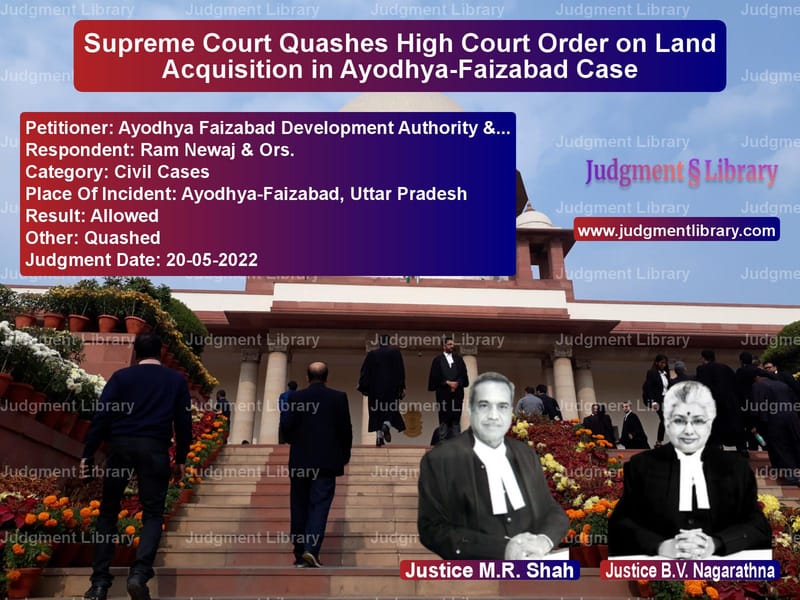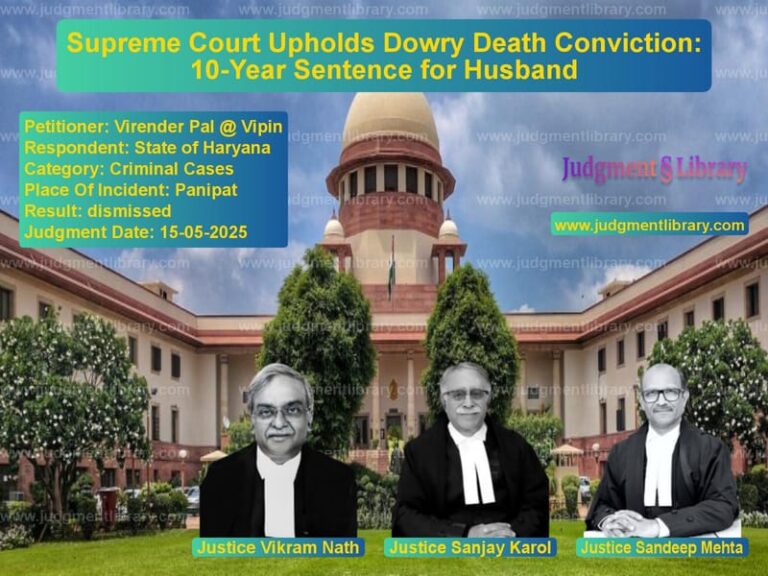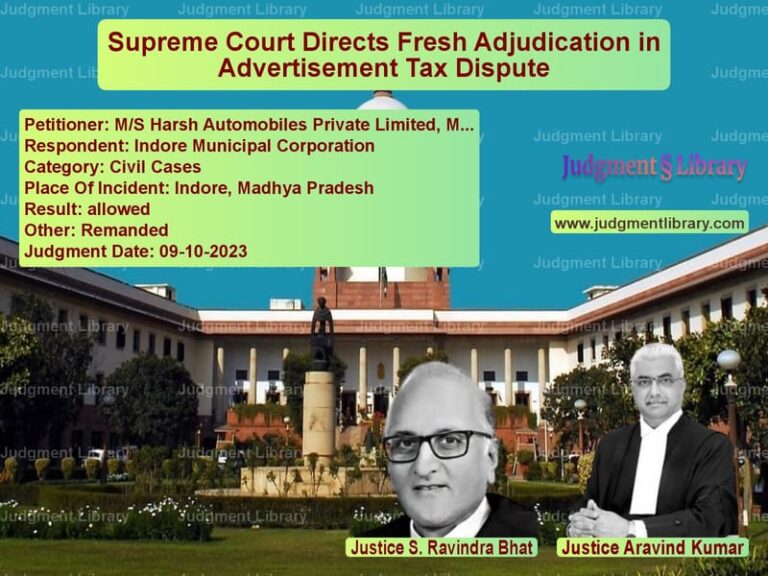Supreme Court Quashes High Court Order on Land Acquisition in Ayodhya-Faizabad Case
The Supreme Court of India recently ruled on a significant land acquisition case in Ayodhya Faizabad Development Authority & Anr. vs. Ram Newaj & Ors., addressing the validity of land acquisition proceedings under the Right to Fair Compensation and Transparency in Land Acquisition, Rehabilitation and Resettlement Act, 2013 (LARR Act, 2013). The case involved a dispute over three plots of land, where the High Court had declared the acquisition proceedings lapsed.
The Supreme Court quashed the High Court’s decision, holding that depositing compensation in the Treasury suffices for compliance under the LARR Act, and possession had already been taken. This judgment resolves an important legal question concerning landowners’ rights and government acquisition powers.
Background of the Case
The Ayodhya-Faizabad Development Authority had acquired three plots for a public project. However, the landowners challenged the acquisition, claiming that the compensation was not properly deposited in the court, leading to the lapsing of the acquisition under Section 24(2) of the LARR Act, 2013.
Read also: https://judgmentlibrary.com/supreme-court-clarifies-compensation-under-land-acquisition-laws/
The Allahabad High Court (Lucknow Bench) ruled in favor of the landowners, declaring that the acquisition had lapsed due to non-payment of compensation as required under the law.
Key Legal Issues
- Whether the deposit of compensation in the Treasury, rather than in the Court, satisfies the requirements of the LARR Act.
- Whether possession of land taken by the government prior to 2013 prevents the application of Section 24(2).
- Whether the High Court’s reliance on Delhi Development Authority vs. Sukhbir Singh (2016) was correct.
Arguments Presented
Petitioner’s (Ayodhya Faizabad Development Authority) Arguments
- The land acquisition was completed as per law, and possession was taken on September 7, 2005.
- The compensation was deposited in the Treasury, and the landowners had not claimed it.
- The High Court misinterpreted Section 24(2) of the LARR Act by relying on Delhi Development Authority vs. Sukhbir Singh (2016), which had since been overruled.
Respondent’s (Ram Newaj & Others) Arguments
- The compensation was not deposited in the Court, as required by law.
- Since the amount was not given to the landowners, the acquisition proceedings should lapse.
- The High Court had correctly applied the precedent from the Sukhbir Singh case.
Supreme Court’s Observations and Ruling
1. Possession Had Already Been Taken
The Court emphasized that possession of the land was taken in 2005, and once possession is taken, Section 24(2) of the LARR Act does not apply:
“Once possession has been taken, there is no lapse under Section 24(2). The land vests in the State, and subsequent non-deposit of compensation does not alter this fact.”
2. Depositing Compensation in the Treasury is Valid
The Court clarified that depositing compensation in the Treasury meets the legal requirement and that landowners cannot later claim lapsing of acquisition:
“Non-deposit in the Court does not lead to lapsing. If the amount has been tendered or deposited, the obligation under Section 31 of the 1894 Act is fulfilled.”
3. Overruling of the Sukhbir Singh Judgment
The High Court had relied on Sukhbir Singh (2016), which had since been overruled by the Supreme Court’s ruling in Indore Development Authority vs. Manoharlal (2020). The Court held:
“The High Court’s reliance on Sukhbir Singh was erroneous. In Indore Development Authority, it was clearly held that non-deposit in Court does not result in lapsing.”
4. High Court Order Quashed
The Supreme Court set aside the High Court’s ruling and reinstated the government’s acquisition:
“The judgment of the High Court is unsustainable and is hereby quashed. The land acquisition proceedings stand valid.”
Impact of the Judgment
1. Strengthening Government’s Acquisition Powers
The ruling clarifies that possession and compensation deposit are sufficient for an acquisition to remain valid, preventing unnecessary lapsing of proceedings.
2. Clarification on Compensation Deposits
The judgment confirms that deposit in the Treasury (instead of Court) is a valid method of compensation payment.
3. Preventing Misuse of Section 24(2)
Landowners cannot claim lapsing of acquisition simply because they did not collect compensation.
4. Legal Certainty for Infrastructure Projects
The decision ensures that major government projects are not derailed due to technical interpretations of the LARR Act.
Conclusion
The Supreme Court’s judgment in Ayodhya Faizabad Development Authority & Anr. vs. Ram Newaj & Ors. reinforces the principle that land acquisition does not lapse due to non-deposit in Court if possession is taken and compensation is deposited in the Treasury. The ruling corrects the misinterpretation by the High Court and provides clarity on the application of the LARR Act, ensuring that government acquisitions remain legally sound.
Petitioner Name: Ayodhya Faizabad Development Authority & Anr..Respondent Name: Ram Newaj & Ors..Judgment By: Justice M.R. Shah, Justice B.V. Nagarathna.Place Of Incident: Ayodhya-Faizabad, Uttar Pradesh.Judgment Date: 20-05-2022.
Don’t miss out on the full details! Download the complete judgment in PDF format below and gain valuable insights instantly!
Download Judgment: ayodhya-faizabad-dev-vs-ram-newaj-&-ors.-supreme-court-of-india-judgment-dated-20-05-2022.pdf
Directly Download Judgment: Directly download this Judgment
See all petitions in Property Disputes
See all petitions in Damages and Compensation
See all petitions in Judgment by Mukeshkumar Rasikbhai Shah
See all petitions in Judgment by B.V. Nagarathna
See all petitions in allowed
See all petitions in Quashed
See all petitions in supreme court of India judgments May 2022
See all petitions in 2022 judgments
See all posts in Civil Cases Category
See all allowed petitions in Civil Cases Category
See all Dismissed petitions in Civil Cases Category
See all partially allowed petitions in Civil Cases Category







